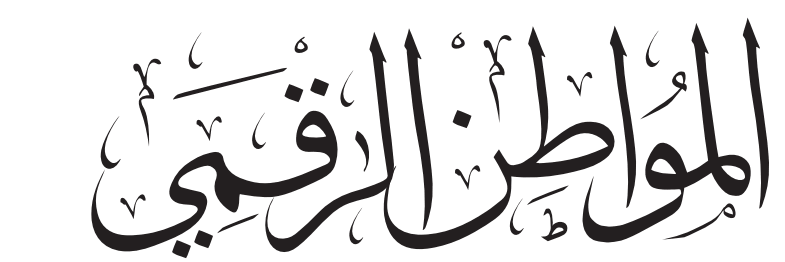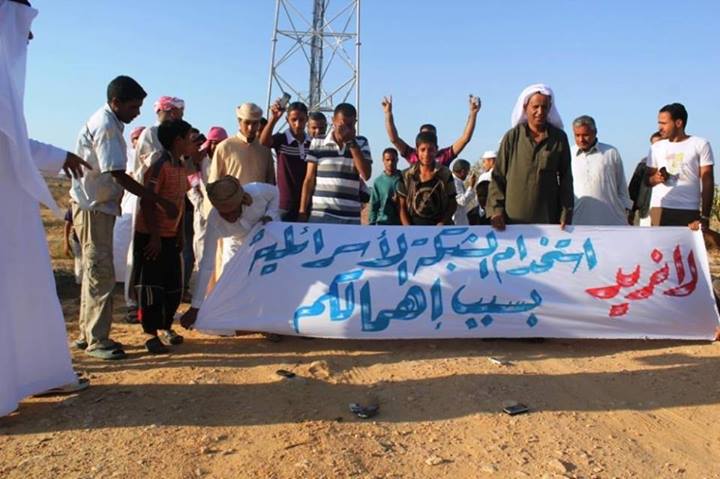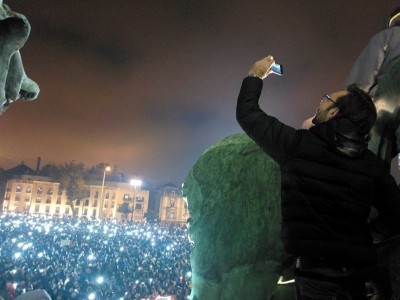
Digital Citizen is a monthly review of news, policy, and research on human rights and technology in the Arab World. Since our last report, access to communications networks has been contested across the Arab region — Internet blackouts continue in Syria and Egypt's Sinai Peninsula, while changes in telecommunications industry and infrastructure have sparked controversy among authorities and civilians alike in Egypt, Yemen and Kuwait. Threats of censorship are on the rise in with newly proposed cyber laws in Mauritania and Morocco and measures to rid the Internet of “negative websites” in Sudan. And state surveillance continues to loom large across the region, notably in Lebanon, where security agencies have been granted unrestricted access to citizens’ communications data.
Bahrain
Activists used the Formula 1 auto racing event, held in Bahrain, as an opportunity to raise awareness about ongoing restrictions on journalists and freedom of expression in the country. Numerous small-scale demonstrations took place in the weeks leading up to the event, many of which resulted in the arrest of protesters. The “Bahrain Racing in Circles” social media campaign, led by the Committee to Protect Journalists and Reporters Without Borders, launched on April 6 as the starting gun of the F1 race was fired. Using the mass messaging social media tool Thunderclap, they reached a combined audience of 4.4 million Twitter followers with the message, “Whether they cover changing tires or burning tires, journalists must be allowed to work freely in Bahrain. #F1 http://thndr.it/1haU78B.”
On April 8, a Bahraini court sentenced blogger Ali Maaraj to a thirty-month jail sentence. He was convicted of “insulting the king” and the “improper handling of information technology.”
Egypt
Internet and mobile network blackouts that have become commonplace in the Sinai Peninsula since the Egyptian military stepped up its presence in the area in September 2013. Officials claim the communication cuts are necessary to secure military campaigns against terrorist groups. Network blackouts last for up to 12 hours each day, affecting myriad aspects of daily life.

A demonstration against mobile shutdowns in North Sinai. Banner reads: “We don't want to use Israeli networks because of your neglect.” Photo by Sinai2014/SinaiOutofCoverage group page.
The National Telecommunication Regulatory Authority deactivated 1.5 million unregistered SIM cards at the end of February claiming they facilitated had phone harassment and other crimes. The Chamber of Commerce called for the deactivation of all informal SIM contracts in the country, which account for an estimated 80% of all contracts in Egypt, according to Al Masry Al Youm.
Fighting for Egyptian citizens’ rights to a faster and cheaper Internet, The Internet Revolution user rights group is threatened to launch a boycott of local ISPs on April 15. The group is demanding faster, cheaper and more accessible Internet service, improved infrastructure, and regulatory reforms to prevent market monopolization. Since its start in February 2014, the group has been in talks with telcos, the Ministry of Telecommunication, and the National Telecommunication Regulatory Authority (NTRA). However, they refused to continue meeting with the NTRA after its director described them as a violent political group in an article in ElWafd, a newspaper owned by a right-wing party of the same name.
Iraq
The Los Angeles Times published an article detailing NSA mass spying activities in Iraq. The story quotes former NSA Deputy Director John Inglis saying that every Iraqi insurgent email, text message and phone-location signal was collected in real time, while noting other officials’ assertion that “obtaining the messages among insurgents required the agency to acquire virtually all Iraqi communications.”
Jordan
The Jordanian Government approved amendments to the nation’s telecom law, choosing the censorship side of the Internet porn debate. Other amendments include renaming the Telecom Regulatory Commision the Telecom and IT Regulatory Commision, and expanding its mandate to monitor and censor content sent over public access networks, as well as increasing all fines included in the law. Meanwhile, the Government revealed that it spent 250k Jordanian Dinars [ar] on consultations for the new law, boasting that the draft law hopes to be modern, and not unlike “developed countries’ experiences.”
Kuwait
After ten years of discussion, Kuwait’s parliament finally approved the establishment of an independent telecom regulatory commission on April 1. A conflict of interest occurred with the previous regulatory system as the owner of the fixed line infrastructure in Kuwait, Ministry of Telecommunication, undertook a regulatory role for the industry. Currently there are three major Internet service providers in Kuwait: Zain, Saudi Telecom affiliate Viva and Wataniya, a subsidiary of Qatar’s Ooredoo.
Lebanon
On March 27, Lebanon’s cabinet granted the nation’s security agency unbridled access to citizens’ telecommunications data, reportedly in an effort to bolster counter terrorism measures. Despite objections from ministers of the March 8 Alliance (Hezbollah, Amal and the Free Patriotic Movement), the new prime minister Tamam Salam approved the decision. According to SMEX, the decision stands in violation of Surveillance Law Article 140, which guarantees secrecy of communication to all Lebanese citizens. This is not the first time authorities have been granted broad access to user data: the first known instance of this kind took place in February of 2012, after the attempted assassination of the Intelligence Information Branch Director (who was ultimately killed several months later.)
Mauritania
The Mauritanian presidency has convened the parliament for a special session to discuss several laws, including a draft cybercrime law. Activists in Mauritania voiced their opposition to the proposed law draft, citing articles they perceive as threatening to freedom of expression online.
The parliament is also due to discuss a legal framework for the Mauritanian Information Society, which among several things, has proposed a law that would regulate (and in some circumstances forbids) the use of encryption.
Morocco
A leaked draft of a new cyber law has triggered fears of increased censorship and restrictions to online privacy. Similar to existing press laws, the proposed law would limit free expression “when it comes to offending the King or the Monarchy, Islam, Morocco Territorial Integrity, public order, homeland security, necessities of public service, or public policy.” Article 54 holds online service providers responsible for user-generated content, with punishments ranging from one month to a year imprisonment and fines of up to 100,000 dirham (roughly $12,300 USD). Authorities would have the power to block “offending websites” that are perceived as “inconsistent with the public political beliefs” under Article 73. Impersonating someone or using their information or image online without permission would be prohibited, but authorities would be authorized to participate in online conversations without identifying themselves, namely in an effort to curb child pornography and abuse. The law would also require mobile phone users to register using their real names.
Cyberactivists launched a campaign with the hashtag #Code_Num and a Facebook page against the law shortly after a draft was posted to an official government website. The draft was later removed.
Another political website bit the dust: the website “Republican Moroccans Radio” was blocked on the evening of Sunday March 23, according to a message on the site’s Facebook page. The site hosts web conferences and promotes views opposed to the Moroccan monarchy.
Journalist and Lakome.com editor Ali Anouzla is currently out of prison on bail, but still faces terrorism charges that could mean up to 20 years in prison. Anouzla’s next court hearing is set for May 20.
Western Sahara
Human Rights Watch issued a brief on online freedom in the Western Sahara. The report highlights cases in which individuals have been forced to hand over the passwords to online accounts to authorities. While websites are not blocked, the report notes that “on the ground in Western Sahara, [Morocco’s] police censor via bullying and batons.”
Saudi Arabia
On 7 May, a criminal court in Jeddah sentenced blogger Raif Badawi to ten years in prison and a thousand lashes for “insulting Islam”. Badawi was prosecuted for developing “Saudi Arabian Liberals”, an online forum he launched in 2008 debating the role of religion in the conservative kingdom. The 32-year-old was also ordered to pay a one million riyals fine (approximately US$266,600). The verdict is subject to appeal. But Badawi's lawyer, Waleed Abu al-Khair, has also been jailed for setting up a human rights monitoring group, according to Human Rights Watch.
After a wave of YouTube videos in which Saudis described their dire living situations in an open appeal to King Abdullah, three citizens who appeared in the videos were detained by Saudi authorities. Under the charges of incitement, sedition and “breaching obedience to the king,” Abdulaziz Al Dusari, Abdullah Al Ghamdi, and Saud Alharbi were detained. Abdulrahman Al-Asiri is currently outside the country and thus remains free.
Following in the footsteps of numerous European countries, Saudi Arabia’s Ministry of Information and Culture blocked access to The Pirate Bay.
Sudan
Sudanese authorities are seeking to block “negative” websites, state-owned media reported in late March citing officials. “In coming days, the negative websites will be blocked 100 percent,” the Sudanese Media Centre (SMC) quoted Mustafa Abdul-Hafiz of the National Telecommunication Corporation as saying. According to the same source, authorities also plan to begin monitoring Internet cafes.
Syria
From March 20-22, various sources reported complete Internet outages in Syria. According to network monitoring group Renesys, an outage affecting most of the country — with the exception of Aleppo, which is served by TurkTelecom — lasted for roughly seven hours. State-owned Syrian Arab News Agency (SANA) blamed the outage on a damaged fibre optic cable in the outskirts of Damascus, while the European Cyber Army, a hacktivist group, claimed responsibility for the blackout, tweeting that it was in retaliation for attacks on Western systems by the Syrian Electronic Army.
Tunisia
Collective blog Nawaat launched Nawaat Leaks, a secure document sharing platform in collaboration with GlobaLeaks, a worldwide open source whistleblowing software. One must use online anonymity software Tor in order to upload information to the platform. Nawaat says it will delete all metadata before publishing any leaked document.
Meanwhile, free speech NGO Article 19 urged the Tunisian government and the National Constituent Assembly to adopt an access to information law before presidential and legislative elections take place later this year. In 2011, the Tunisian government issued Decree 41 guaranteeing the right to access administrative documents. However, the organization argues that a law adopted by the legislative body would “afford greater legal protection than” a decree.
United Arab Emirates
On March 17, the Gulf Center for Human Rights reported that Emirati security officers arrested activist Osama al-Najjar. It is unclear why al-Najjar was arrested. The Center says he had been active on social media, posting tweets related to the trial of the UAE94, a group of Emirati citizens imprisoned for allegedly plotting a coup against the UAE government. Al-Najjar’s father, Hossain Al-Najjar, is among the UAE94 detainees currently serving a ten-year jail term.
Yemen
Controversy over proposals to privatize the telecommunications industry has resurged since the Yemeni government signed an agreement to join the WTO in December 2013. Yemeni Ministry of Telecommunications and its employees protested government plans to liberalize the country’s telecom sector on April 2. Employees refused the agreement that lacked a plan to protect the labor rights of the 12,000 employees in the telecom and post office sector.
The Yemeni Consumer Protection Association has supported the decision, blaming monopolies, bad laws and lack of a comprehensive telecom strategy for the bleak state of telecommunications in the country. Yemen has the lowest Internet penetration rate in the gulf region. The number of Internet cafes in the capital city of Sana’a, which peaked at 800 in 2010, has since been reduced by nearly fifty percent. This is attributed to both the energy crisis and the spread of wireless and mobile connectivity in the country.
The Guardian named Yemeni journalist Farea Al-Muslimi one of thirty “top young people in digital media.” “Al-Muslimi is the ultimate example of what it's possible to do if you have an internet connection and a story to tell,” the article read.
In brief
-
Turkey’s ban on Twitter in early March has been condemned by human rights and free speech groups around the world.
-
The story of ZunZuneo, a USAID-funded Twitter-like SMS platform in Cuba, has drawn widespread criticism for its reductionist approach to using social media for social change, and has also drawn attention to the broader use of social media for intelligence operations by US, UK and other Five Eye member countries.
-
The newly published book Wired Citizenship: Youth Learning and Activism in the Middle East examines evolving patterns of youth learning and activism in the Middle East and North Africa.
From our partners
-
7iber launched a research project dubbed “Digital Privacy in Jordan: Perceptions and Implication.”
-
EFF, Access, and Global Voices Advocacy signed a statement calling on the Freedom Online Coalition take a stand against the surveillance of human rights organizations worldwide.
Upcoming events
-
Stockholm Internet Forum, May 24-29
-
ArabNet Digital Summit, Dubai, June 3-5
Digital Citizen is brought to you by Advox, Access, EFF, Social Media Exchange, and 7iber.com. This month’s report was researched, edited, and written by Afef Abrougui, Reem Almasri, Hisham Almiraat, Ellery Roberts Biddle, Jamila Brown, Roqayah Chamseddine, Mohamed ElGohary, Bilal Ghalib, Amr Gharbeia, Wafa Ben Hassine, Katherine Maher, Dalia Othman, Courtney Radsch, Mohammed Tarakiyee, Jillian C. York, and translated into Arabic by Mohamed ElGohary.
To subscribe to Digital Citizen by email, sign up here.



